Article's Content
Whoever owns the most-used AI products will likely rule the future of tech, as AI is going to lead a revolution that will add up to $4.4 trillion to the global economy.
That’s why every leading tech company is pouring resources into investments in AI startups.
The more AI becomes a part of how every company does business and builds their infrastructure, the more their integrations with their funders’ products will matter. The more companies rely on OpenAI, for example, the more likely they will use Microsoft Azure and buy Microsoft’s AI chips.
So, knowing who backs which AI companies will help you see who’s going to determine the future of tech. Let’s break down who’s behind which ones, how they stand to benefit, and how that could change the future of SaaS.
Top 5 SaaS AI Companies and Who Funds Them
Here are the five best-funded AI companies in SaaS and who’s funding them. First, a quick breakdown:
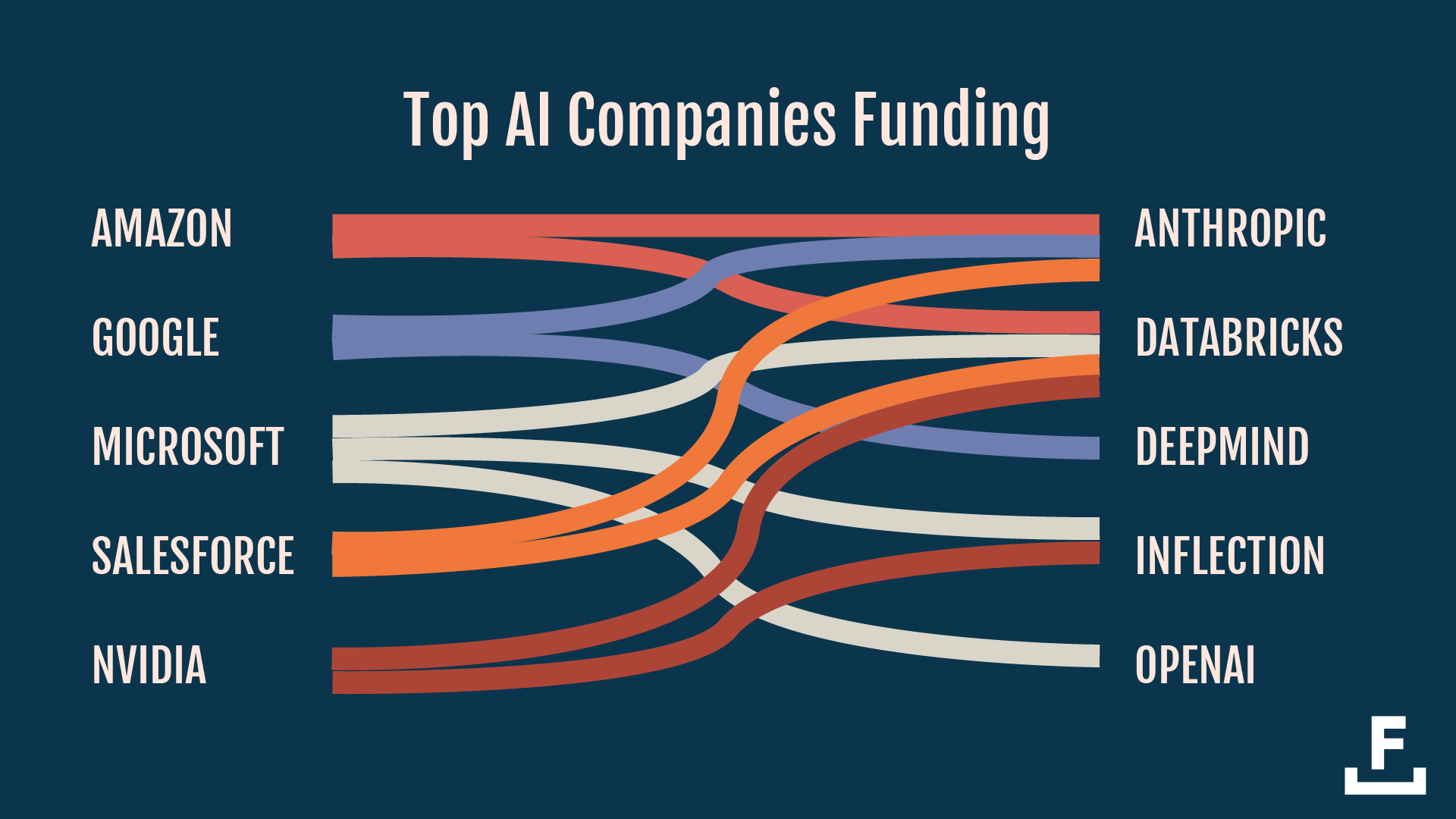
As you can see, there’s a complicated relationship between AI startups and their funding. While OpenAI and DeepMind each have sole funding sources, the other three have a mix of support from different major tech companies.
1. OpenAI
OpenAI created the most widely-known and used large language model (LLM) product out there as of writing: ChatGPT. Powered by OpenAI’s GPT-4 model, it’s capable of doing everything from data analysis to article writing with impressive accuracy.
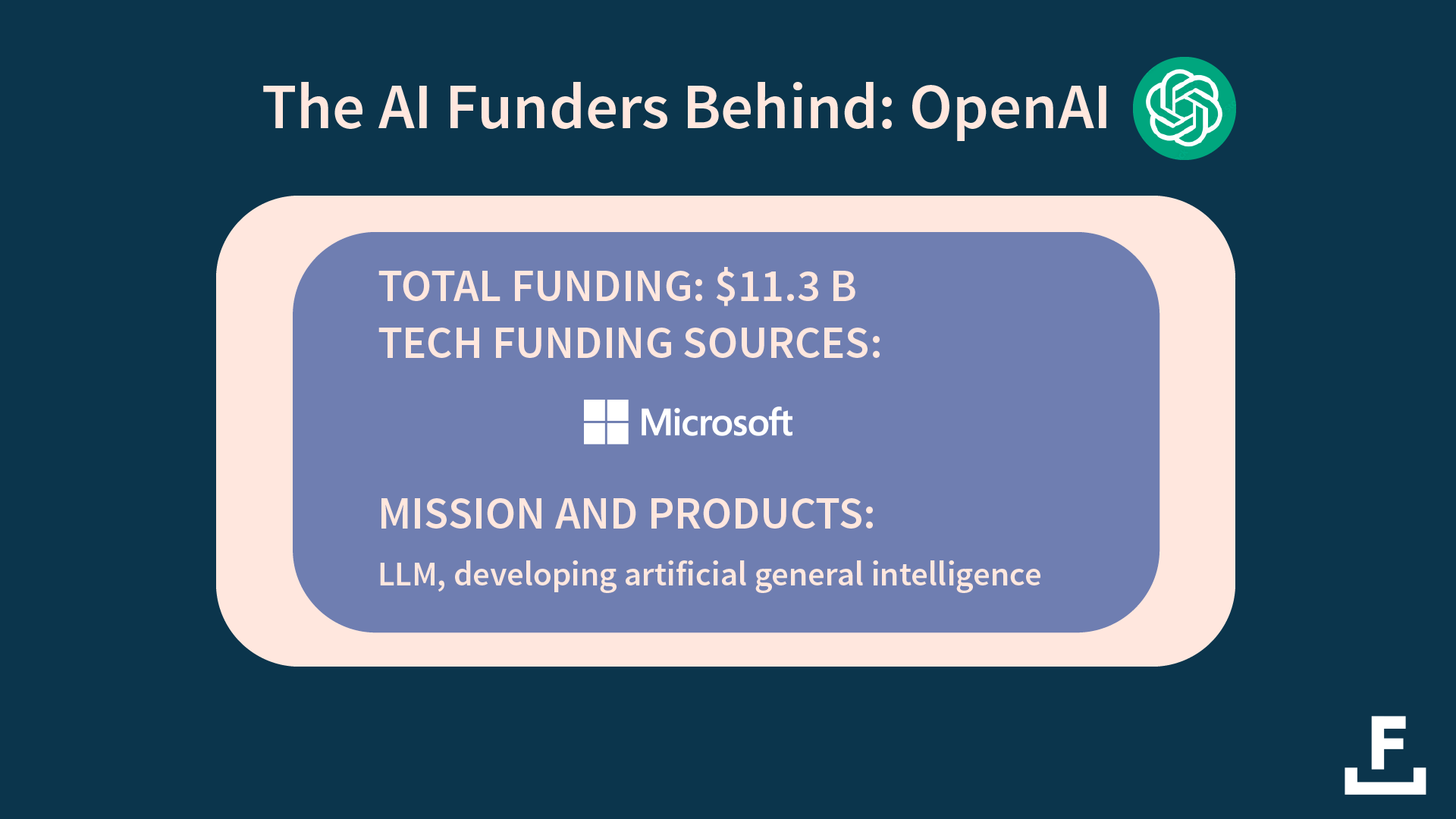
OpenAI was founded on December 11, 2015. After four years of hard work, they started making headlines with their GPT-2 release in 2019. But it wasn’t until 2022 that they released ChatGPT and launched into the public spotlight.
Microsoft famously invested $10 billion in OpenAI in early 2023. This huge play showed a focused prediction on where the tech giant sees the best opportunity for dominating the industry. It also moves OpenAI to the top of the list as the best-funded AI startup.
Looking forward, OpenAI’s CEO Sam Altman says that his team is “extremely focused on making AGI” or artificial general intelligence. AGI is a form of artificial intelligence that can reach human levels in any intellectual task. ChatGPT is a narrow form of AI — it has a great language model — but it relies on another AI model, DALL-E, to make images. An AGI would excel at both these and a huge variety of other tasks.
If OpenAI succeeds in being the first company to develop AGI, it would certainly be an enormous competitive advantage.
2. Anthropic
Anthropic is a newer player in the AI field, founded in 2021. They emphasize the development of AI systems that are reliable, interpretable, and steerable. Founded by former OpenAI employees, including siblings Dario and Daniela Amodei, Anthropic aims to address some of the ethical and safety concerns that have emerged in the AI industry.
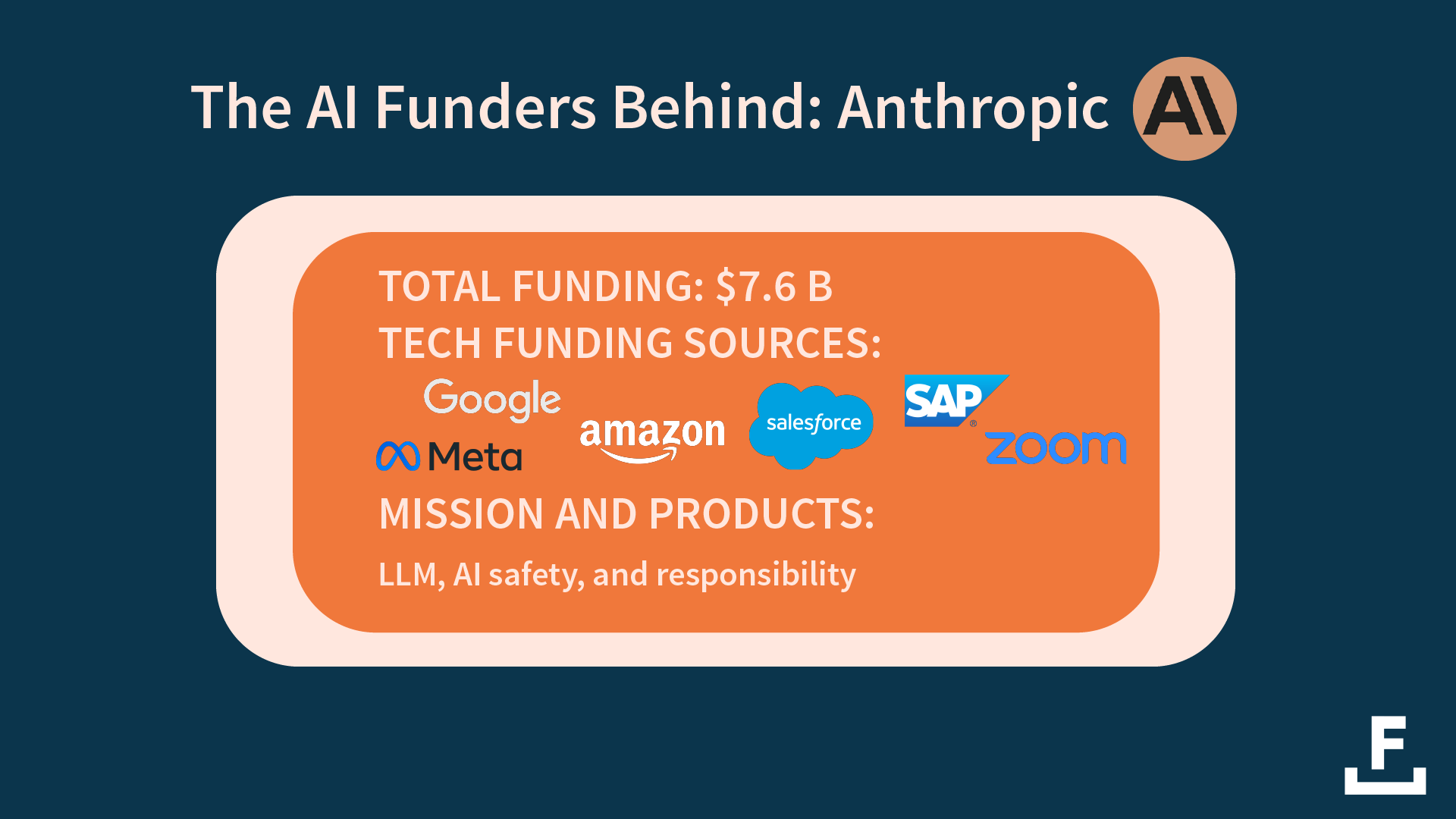
Anthropic’s primary project is Claude, an AI model designed to be more transparent and easier to direct than existing models. By focusing on these aspects, Anthropic aims to build AI that can be more effectively integrated into various applications. At the same time, they seek to minimize the risks of negative impacts of AI like the creation of fake news or causing disruption to the job market.
Their impressive funding pool of roughly $7.6 billion draws from a broad spectrum of tech giants, including Google, Amazon, Salesforce, SAP, Zoom, and Meta. This diverse investment portfolio not only underscores the wide-ranging interest in Anthropic’s mission but also reflects the strategic importance of their products in the tech ecosystem.
The involvement of these tech powerhouses as funding sources indicates a strong belief in the potential of Anthropic’s work on LLMs and AI safety. Each investor brings to the table not just financial resources but also vast networks, technological capabilities, and market reach that could greatly benefit from advancements in AI technology that is safe, reliable, and ethically responsible.
3. Google DeepMind
DeepMind, acquired by Google in 2014, is a pioneer in the AI industry known for their groundbreaking work in deep learning and reinforcement learning. They recently released Genesis, a ChatGPT competitor whose poor launch has caused a selloff in Google stock worth about $90 billion.
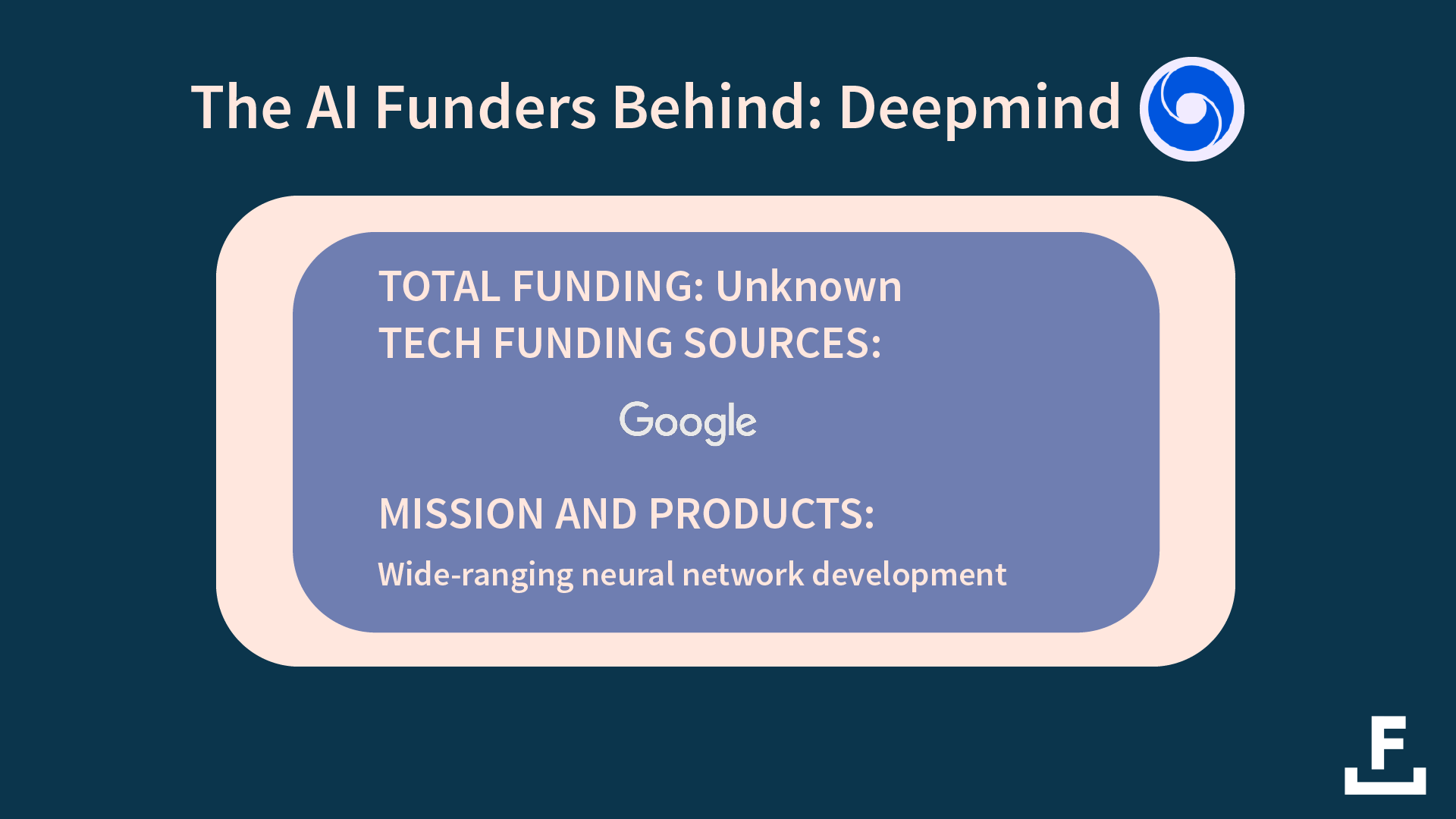
DeepMind’s mission is to solve intelligence and then use that to solve everything else, and their research spans multiple areas. Some notable ones are healthcare, where its AI has helped in predicting acute kidney injury and improving eye disease diagnosis, and energy, where it has reduced energy consumption in Google’s data centers.
The acquisition by Google provides DeepMind with access to unparalleled computing resources and allows them to leverage Google’s vast data and technical infrastructure. This relationship not only accelerated DeepMind’s research but also enabled Google to integrate their recent AI chat Gemini into products like Gmail.
4. Databricks
Databricks, with a total funding of $4.2 billion, has established themself as a powerhouse in the realm of big data and analytics. Founded out of a lab at Berkeley, the company has grown to change how businesses approach large-scale data analysis, storage, and business intelligence.
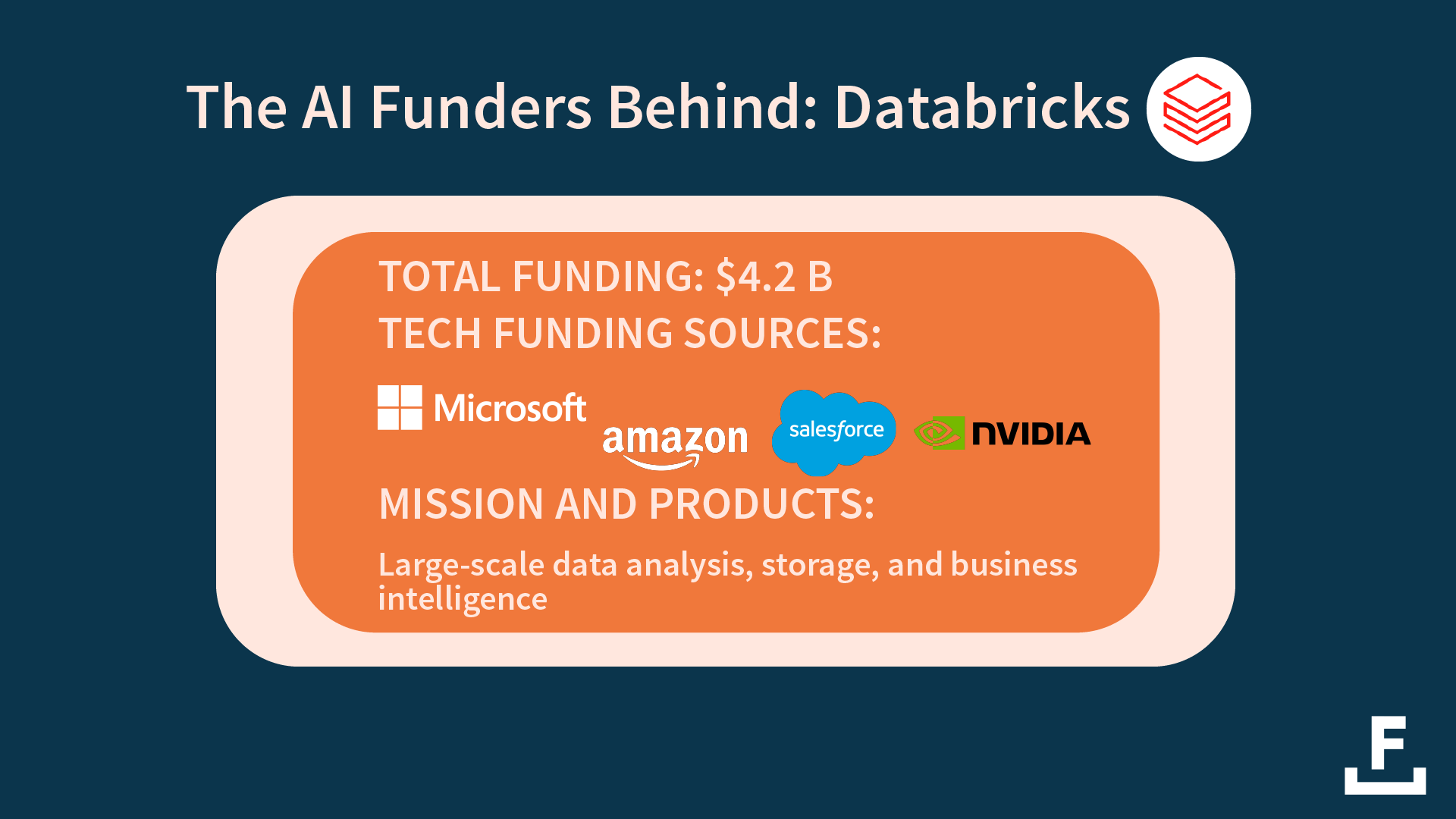
The backing of tech giants such as Microsoft, Amazon, Salesforce, and Nvidia not only provides Databricks with substantial financial resources but also aligns them with some of the most influential players in the tech industry. This partnership reflects a shared vision for the future of data analytics, emphasizing the importance of scalable, efficient solutions for handling big data.
Databricks’ trajectory from a project born out of academic research to a multi-billion dollar company underscores their pivotal role in the evolution of data analytics. Their platform has become indispensable for data scientists and engineers, offering a unified environment that fosters collaboration and innovation in data-driven projects.
5. Inflection AI
Co-founded by industry veterans with a vision for improving human-computer interaction, Inflection AI has secured $1.5 billion in funding to develop conversational AI. This technology aims to make interactions with AI more natural and intuitive, bridging the gap between complex machine learning models and everyday usability.
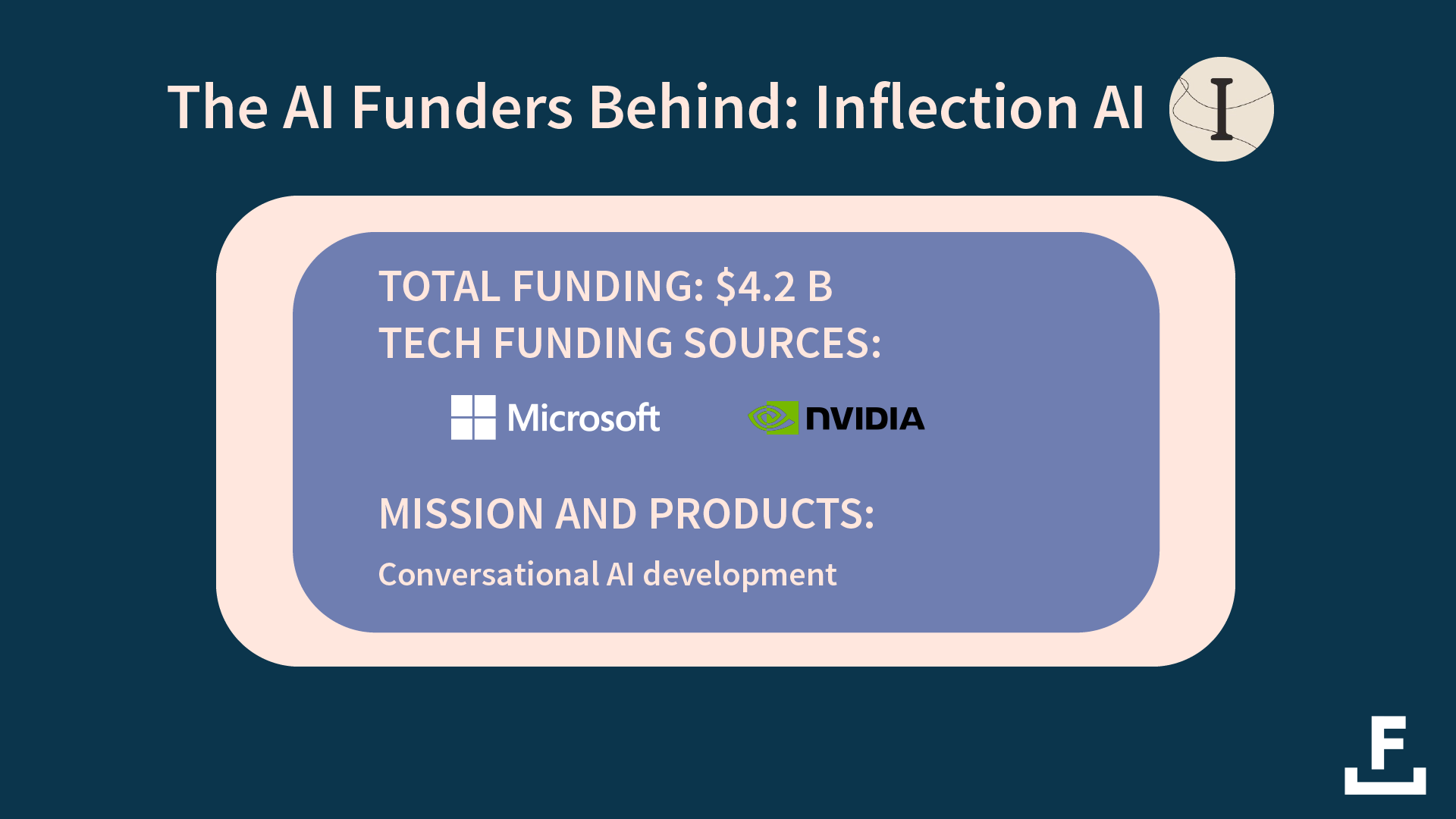
With Microsoft and Nvidia as their primary tech funding sources, Inflection AI is well-positioned to lead in the development of conversational AI. This support from tech giants highlights the potential of Inflection AI’s mission. It also signals their strong belief in the company’s approach to making AI more accessible and practical for a broad audience.
The company’s focus on conversational AI development represents a significant step towards creating AI systems that understand and respond to human language and intent more effectively. Inflection AI’s journey reflects a broader industry trend towards AI that better uses and responds to emotional language, promising a future where AI supports more nuanced and meaningful interactions.
What AI’s Top Tech Funders Stand to Gain
Tech companies invest differently than how venture capitalists or banks do. They aren’t just interested in identifying companies that will grow. They want to identify companies with unique technologies and brilliant people who can create synergy with their current offerings.
Let’s unpack the strategic moves from five key companies making huge investments in AI.
Microsoft
Microsoft’s most attention-grabbing investment was the $10 billion check it wrote to OpenAI. Since then, their stock price has risen by more than 75%, to a market cap of more than $3 trillion at the time of writing. Microsoft is currently the largest company in the world.
But it isn’t just the tech behemoth’s OpenAI investment that has led to this rise in value. Microsoft has continued to make sizeable AI investments, including their recent announcement of a $2.1 billion investment in AI infrastructure in Spain.
That’s because Microsoft believes AI investments will complement their other products.
Companies they invest in will rely on Microsoft Azure’s cloud infrastructure, and using those tools will be easier for customers who use Microsoft products. Microsoft’s custom AI chips will power that cloud infrastructure, creating even more vertical integration.
Amazon
Similar to Microsoft, Amazon is hoping its Amazon Web Services (AWS) cloud infrastructure will support the AI of the future — and the people using that AI.
AWS already brings in $90 billion a year, so it’s not hard to imagine that kind of industry dominance sticking around for an AI-powered future, as long as Amazon’s AI investments pay off.
Anthropic has already announced that they will use AWS for their cloud infrastructure and Amazon’s Trainium and Inferentia chips, setting up a level of vertical integration similar to that of Microsoft.
Nvidia
Remember how Microsoft and Amazon are making their own AI chips? Well, those chips need another type of processor, called a GPU. In both those cases, Nvidia has created partnerships to make sure those tech giants use Nvidia GPUs.
At the same time, Nvidia is doing their own investment in AI companies, clearly marking who will have the processing power to succeed in an AI-powered future.
Alphabet
Alphabet, the company that owns Google, is the toughest company to evaluate on this list. That’s because they have kept their most significant AI investments in-house by merging Google Brain and DeepMind back in April of 2023.
They’re also offering their own new AI chip and cloud platform. In fact, Google Cloud customers have access to AI models from Anthropic, Meta, and 98 others. It appears that Alphabet’s strategy here has more to do with width, not depth. That lets them hedge their bets across many different viable AI products without having to predict which one will come out on top.
Salesforce
This name might stand out to you here — they’re the only company on this list worth less than $1 trillion. But Salesforce has been making strategic AI investments just like the rest of these companies.
Salesforce’s game isn’t in chipmaking or cloud infrastructure. Instead, they’re looking to solidify their status as the premier sales analytics and sales intelligence platform.
With AI features in marketing, sales, and customer operations, Salesforce is always looking for the next way to expand with AI. In fact, they just released Einstein Copilot, a conversational AI model that helps users interpret their data. These kinds of innovations let Salesforce capture even more of the CRM market by offering features and capabilities that nobody else can.
How to Keep up with the Biggest Names in Tech
You might not have $10 billion on hand to invest in AI. But, tracking the strategic moves of industry leaders is a way to understand how SaaS will change as we look to the (not-so-distant) future.
As AI becomes more integrated into marketing operations and strategies, understanding the connections and motivations behind these major tech players will help you stay on top of every key development.
Ready to dive into even more in-depth breakdowns of how tech leaders plan their strategic moves? You can read these case studies and even more great advice at Foundation Labs.







